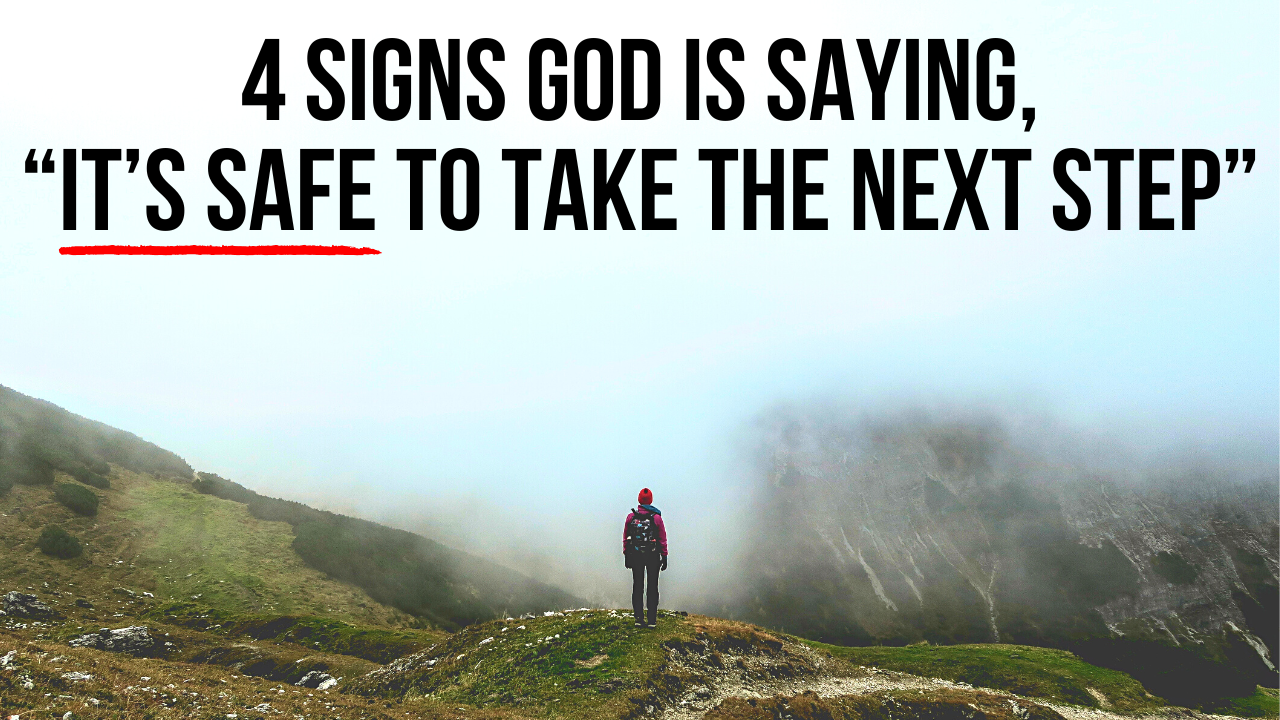
You don’t want to miss out on good opportunities in life, but you also don’t want to get hurt.
How will you know when it’s safe to transition out of your season of healing into a season of dating? How will you know if it’s dangerous to open your heart more to someone? And how will you know if it’s a good idea to pursue that new career opportunity?
Here are 4 signs God is saying, “It’s safe to take the next step?”
1. If You Are Genuinely Seeking to Please the Lord and Follow His Presence, It’s Usually Safe to Take the Next Step
Following God is not like a wild-goose chase. Rather, when we speak to God, he also speaks back. However, the good thing about praying and asking God for wisdom is that he will respond if you ask in faith (James 1:5-6). This is why you are usually safe to take the next step that you want to take if you are genuinely trying to please the Lord and follow his presence. Perhaps you are wondering if you should call that woman, go on the second date with that guy, or apply for that job promotion.
Since you are trying to please God and follow him, you would have been open to receiving a warning or a “no” from God. If for some reason you are unsure of what God is saying, it’s usually wise to take that next step because then God will give you more information after you take that step.
Safety won’t be found in having all the answers. Safety won’t even be found by avoiding all dangers. Rather, true safety is found when you follow the Lord and do what he says.
As Psalm 4:8 explains, “In peace I will both lie down and sleep; for you alone, O Lord, make me dwell in safety.”
2. If You Are Including Other Christians in Your Decision-Making Process, It’s Usually Safe to Take the Next Step
Ultimately, you must follow God’s leading and not man’s leading. However, one principle in Scripture is that God’s leading is best confirmed through multiple minds rather than just one mind.
It’s much easier for one person to claim to have a vision or a revelation from God than it is for many people to have the same experience and come to the same conclusions (1 Corinthians 15:5-9). This is why the Bible’s teachings are not given to us by one man. Even Paul, who wrote the most books in the New Testament, made sure that the other apostles agreed with him that he was interpreting the Scriptures and revelations properly (Galatians 2:1-2).
Likewise, the more Christians who agree that you are making a wise choice, the more likely it is that you are actually making a wise choice. As Proverbs 11:14 instructs, “Where there is no guidance, a people falls, but in an abundance of counselors there is safety.”
3. If This Step Is Wise or You Have Received an Abundance of Clear Confirmation, It’s Usually Safe to Take the Next Step
In the practical sense, it was not wise for Israel to march around Jericho for six days and then on the seventh to blow the trumpets and shout so that the walls would fall (Joshua 6). It wasn’t wise to for Gideon to reduce his fighting men from thousands to just 300 (Judges 7). It wasn’t wise for Jesus’ disciples to remain in Jerusalem after the Pharisees there just crucified their leader, and yet that is exactly what Jesus told them to do (Acts 1:4-5).
Usually God will lead us to make wise decisions. There are times God will lead to us to take unwise risks. In Scripture, however, whenever God does lead someone to do something “unwise,” he always gives them very clear confirmation that this is indeed what he wants them to do.
God didn’t tell the Israelites to march around Jericho, Gideon to reduce the fighting men, or the disciples to risk their lives through a small whisper in their hearts. He made it very clear through visible, unmistakable signs that his is what he was saying. If you are about to do something unwise even though you just have a feeling in your heart or mind that this is God and you lack other forms of confirmation (like Scripture, Christian counsel, open doors outside of your control), you should not consider yourself “safe.”
As we apply this principle to our own lives, this means you are safe when you are doing something that is biblically wise or when God gives you abundant confirmation to take a risk that others would deem unwise.
4. If Your Relationship with God Is Not at Risk, Then It’s Often Safe to Take the Next Step
The terms “safety” and “danger” are relative terms. Their meaning depends on what context you are using them in. For the Christian, we can always consider ourselves “safe” no matter what dangers we face so long as we do not compromise our relationship with God.
This is true not because God will always keep us physically safe. Rather, this is true because our relationship with God is what matters the most (Philippians 3:8-11). So long as we are connected to Christ, we are safe for eternity and can flourish no matter what earthly dangers we face (Romans 8:37-39).

You may also like:
- 3 Biblical Ways to Know If You Missed a Sign…
- 3 Signs God Is Saying, “You’re Almost Ready”
- 5 Signs You’re Unknowingly Acting Masculine and Pushing Good Men…
- 10 Things You Will Notice If You Carry God’s Presence
- 3 Signs God Is Trying to Get Your Attention
- 3 Reasons God Is Letting You Go Through an Impossible…